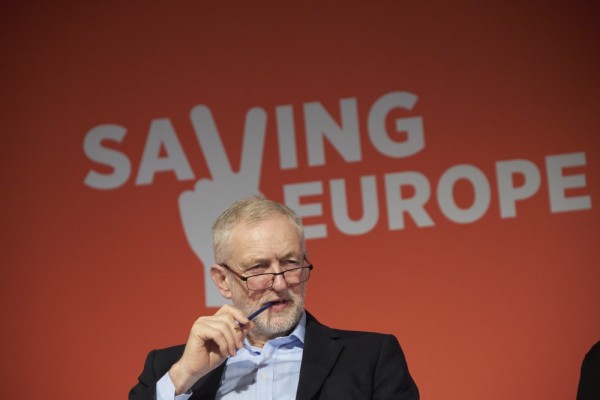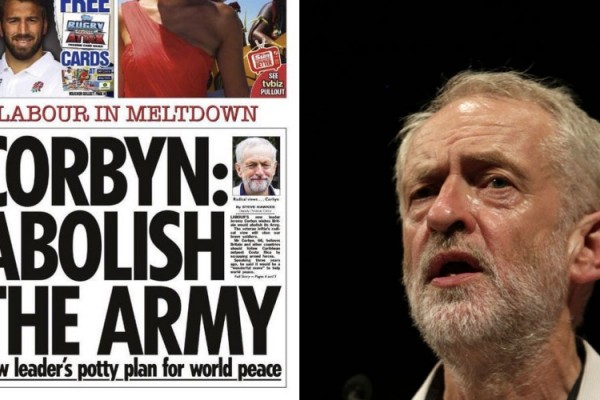UK Labour Party’s leadership race a test of strength for grassroots democratic socialism
The left faces the task of electing a new leader who can sustain the party’s democratic socialist, anti-imperialist mandate

UK Labour Party leadership hopeful Rebecca Long-Bailey looks on as Jeremy Corbyn delivers a speech. Still image from YouTube.
As neoliberal centrists seek to use the British Labour Party’s disastrous election defeat to push for a return to Blairism, the left faces the task of electing a new leader who can sustain the party’s democratic socialist, anti-imperialist mandate. Whether or not this is achieved will have important implications for left movements worldwide.
After losing by a landslide to one of the most right-wing Conservative governments in modern British history, Jeremy Corbyn said he would not lead the party into the next election, but would stay on for a “period of reflection” and to help guide discussions about the party’s future.
Following that announcement, former Labour prime minister Tony Blair slammed what he described as the party’s “misguided ideology and utter incompetence,” and claimed that if the left maintains control of the party, “the Labour party is finished.”
The news resonated internationally, as well. In the U.S., pundits, glossing differences between British and American politics, claimed the U.K. results should serve as a warning to supporters of senator Bernie Sanders’ campaign for the Democratic Party’s presidential nomination.
In Canada, commentators touted Labour’s election defeat as a reason to quiet any talk of the NDP adopting a more grassroots approach to policy-making.
Soon after the U.K. election night exit poll, ex-director of the NDP Karl Bélanger smugly retweeted a 2017 column (which lacked any mention of policy) in which he doubted NDP members should “replicate Sanders and Corbyn’s model for where the party should go.”
Another ex-staffer for the NDP blamed Labour’s defeat on Corbyn wanting to “nationalize basically everything under the sun,” and said the U.K. results demonstrate a need to stop criticizing moderate provincial wings of the NDP for their “supposed imperfections and sins.”
The fact is, however, that Labour did not lose the election because its platform was too radical. Cornerstone Labour policies—including renationalizing railways, raising the minimum wage, boosting health spending and raising taxes on higher earners—were well received by large majorities of the British electorate. On the other hand, data indicates that it was primarily Labour’s inability to replicate its 2017 electoral coalition between predominantly leave-voting supporters in the north of England and remain-voting supporters in urban centers—not the party’s other policies—that cost it the election: crucially, of the 54 seats Labour lost to the Conservatives, 52 voted to leave the European Union in 2016.
In what was widely-regarded as the Brexit election, Labour’s equivocation (promising a second referendum on the U.K.’s EU membership in which the leadership said it would remain “neutral”) was clearly a disaster. Any attempt to interpret Labour’s loss as a rejection of radical politics is therefore woefully misguided, and must be called out for the opportunistic bunk that it is.
Still, the outcome of the upcoming leadership race will be a critical test of whether or not the movement Corbyn helped inspire can outlive the temporary popularity of its outgoing leader. The result will also further indicate whether the international re-emergence of left movements constitute a flash in the pan, or part of a deeper realignment.
Leadership candidates Rebecca Long-Bailey and Keir Starmer, the two current favorites to win the race, have nominally placed “socialism” and the need for a Green New Deal at the front and centre of their opening leadership pitches. However, the left should be cautious about throwing support behind candidates simply because they pay lip-service to those labels. There are good reasons to be concerned that Long-Bailey, and Starmer in particular, might compromise on key policy areas.
Potential Labour leadership candidates (from left): Emily Thornberry, Keir Starmer, Jess Phillips, Rebecca Long-Bailey, Lisa Nandy (PA/AFP/Getty/Reuters)
As a recent investigative piece from Novara Media revealed, Starmer’s leadership campaign is run by a former staffer from Labour MP Owen Smith’s unsuccessful campaign to oust Corbyn in 2016. A subsequent report found that one of Starmer’s closest political advisors previously worked as a private healthcare lobbyist.
It should also be noted Starmer was a vocal advocate for Labour’s disastrous second referendum policy. It’s unclear how Starmer, who flip-flopped several times on the party’s Brexit position, would win back the working-class leave-voting constituencies Labour lost to the Conservatives in 2019.
While Long-Bailey’s “socialist” credentials appear at face value to be much more authentic than Starmer’s (Long-Bailey was one of the key architects of Labour’s 2019 Green New Deal platform and recently pledged to abolish the U.K. House of Lords), she recently refused to rule out using nuclear weapons if she becomes prime minister. Long-Bailey (along with all the other leadership contenders) also promised the Board of Deputies of British Jews that she would uncritically adopt the International Holocaust Remembrance Alliance’s working definition of antisemitism, which has been widely criticized by Jewish and Palestinian civil rights groups as designed to demonize any and all criticism of the Israeli government.
While Long-Bailey has the backing of Momentum, the party’s main left-wing organizing group, her recent statements appear to have demoralized sections of the party membership that initially hoped she would build upon Corbyn’s firm anti-war and anti-imperialist positions. Plus, the manner in which Momentum endorsed Long-Bailey has been criticized by some members as undemocratic.
Scrutinizing these details is not about applying some kind of ideological purity test, but anticipates the dangers of caving in to pressure from the hostile press and Labour’s right-wing. Given the unlikelihood of an openly Blairite candidate capturing the leadership this time round, centrists in the party might strategically view a watered-down, soft-serve iteration of “socialism” as the beginning of a rightward drift back towards third-way politics (this is more or less what happened to the party after Michael Foot’s election defeat in 1983, when Neil Kinnock moved the party to the more centrist position that preceded Blair’s takeover in 1994).
Sadly, none of the other three candidates who secured sufficient parliamentary nominations to enter the first round of the leadership race—but who will need to secure enough nominations from party chapters to make the final ballot—offer much hope for advancing a promising policy agenda.
Contender Jess Phillips, for example, has been criticized for hitching her campaign to nondescript platitudes that reveal very little about what she actually stands for ideologically. Meanwhile, Lisa Nandy, when asked whether she would maintain Labour’s 2019 policy of nationalizing key industries, replied by saying that people found the prospect of a Labour government “frightening.” Then there’s Emily Thornberry, one of the party’s most aggressively pro-EU MPs (she once gave a speech wearing an EU flag-themed dress—difficult to see that sitting well with Labour’s leave-supporting heartland voters).
In a field of relatively underwhelming candidates, the best possible outcome appears to be a Long-Bailey victory. Though far from ideal, Long-Bailey is at least the best chance the left has of keeping anti-austerity and a radical green industrial strategy in mainstream conversation, and holding the line against those who would use the U.K. election results to silence grassroots democratic socialist movements everywhere.
Alex Cosh is a writer and graduate student based in Powell River, British Columbia. He writes for PressProgress, and is the Opinions Editor at rabble.ca.










